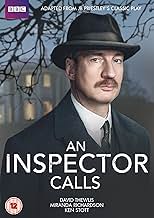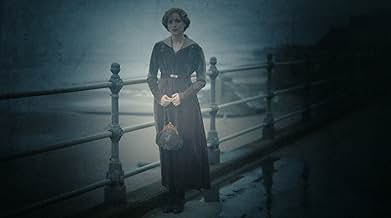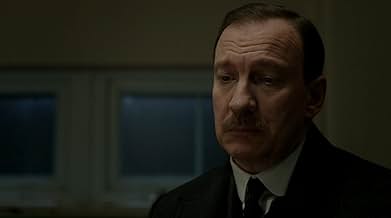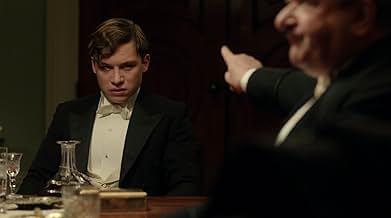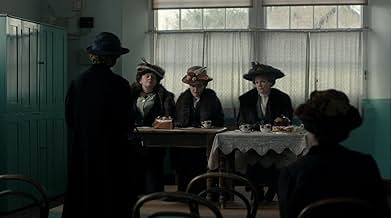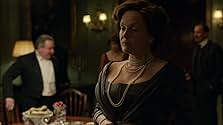Ein seltsamer Inspektor unterbricht die Verlobungsfeier im Hause der wohlhabenden Fabrikantenfamilie Birling und befragt die Familienangehörigen zu den Umständen, die zum Selbstmord einer ju... Alles lesenEin seltsamer Inspektor unterbricht die Verlobungsfeier im Hause der wohlhabenden Fabrikantenfamilie Birling und befragt die Familienangehörigen zu den Umständen, die zum Selbstmord einer jungen Frau geführt haben.Ein seltsamer Inspektor unterbricht die Verlobungsfeier im Hause der wohlhabenden Fabrikantenfamilie Birling und befragt die Familienangehörigen zu den Umständen, die zum Selbstmord einer jungen Frau geführt haben.
- Regie
- Drehbuch
- Hauptbesetzung
- Auszeichnungen
- 2 Gewinne & 5 Nominierungen insgesamt
- Gate Keeper
- (Nicht genannt)
- Posh Lady
- (Nicht genannt)
- Millward's Shop Customer
- (Nicht genannt)
- Young Eva
- (Nicht genannt)
- …
- Factory Worker
- (Nicht genannt)
- …
- seaside Photographer
- (Nicht genannt)
- Factory Worker
- (Nicht genannt)
Empfohlene Bewertungen
The play is opened up just enough so as you'd notice with some external scenes but mostly, as you'd expect it's played indoors, intensifying the drama to a backdrop of hypnotic chamber music as the plot edges inevitably to its climaxes. I say climaxes because of the two big reveals that Priestley employs, firstly exposing the hypocrisy of the staid pre-Great War English society in their links to this young woman's demise and then the brilliant twist at the end just when it seems as if they've all gotten away with it.
Some of Priestley's wider themes seem to be just that, i.e. wide of the mark, like his prediction of a bloody uprising by the downtrodden working classes, although considering the social upheaval later in the depicted decade, obviously with events abroad in Russia, Ireland and Weimar Germany to name but three, never mind the General Strike and Red Clydeside disputes of the post-War era here in Britain maybe he wasn't so far out either. It's only in the words and actions of the two youngest members of the afflicted Birlings that we see any hope of societal change in the future as we observe their conscience-stricken reaction to events, neither tainted by the jaundiced, self-motivated experience of their elders.
The treatment of the Inspector I thought played up the fantastic element just a little too much with the extended epilogue showing him as a sort of omnipresent spirit surrounding Eva as she comes to her fateful end almost as if the director felt the need to explain his unexplained presence,which for me reduced the character's effectiveness as the pricked conscience of the group, his last appearance should really have been after he finished with the family at the house.
Nevertheless, any production like this which respects the context of the original play as this one undoubtedly does, even if at times it creaked rather than crept along, still managed to entertain me just as it always has, as a taut, cleverly written, psychological thriller with a moral in the tale.
To be honest, right at the beginning when the characters were presenting themselves at the dinner table I found most of their portrayals quite bland and out of character in a sense- especially Eric and Sheila. I found them lacking that strength and uniqueness that had made me strive for them while reading the play, but then again it's true that at the beginning their personalities were much more superficial and that were mostly developed as the play progressed- something which was shown naturally in the film.
Nevertheless, as soon as the plot starting moving the skepticism faded away and I was left awestruck by the actors' outstanding performances; Mr and Mrs Birling were just how I pictured them throughout the story; Gerald was given much more emotional depth than what I had imagined and Eric even though it wasn't how I initially thought of him made me comprehend a completely different interpretation of his character. I am not quite sure of Sheila yet, but I do have to admit that Chloe Pirrie reflected her major character development, but I imagined Sheila as a more immature and naive girl in the beginning. Let's not forget about Sophie Rundell's breathtaking job as Eva: taking only brief descriptions from a dead girl and turning that into a round character with a profound, political and representative meaning behind it.
Even if the characters' portrayals is essential to the film, what really sticks to the audience are the audiovisuals, and I can assure you this film excelled in that job. The shots were beautiful and gave the story a deeper meaning for me as a viewer and indeed hinted many subtle messages that otherwise wouldn't have made much sense. Above all, what most impressed me was the score; from the beginning until the very end the score was used skilfully to match the characters' emotions in certain scenes, but the feeling of strings and a piano matched the main themes of the play, and probably may be the main reason for my passionate liking of this film.
I must admit I had my doubts beforehand about this, I tend to think sometimes if it ain't broke don't fix it, I love both the 1954 and 1982 versions respectively. This though had me utterly engrossed, it was an outstanding version. It looked superb, the factory scenes looked incredibly authentic, as did the scenes in the house.
I liked how it began too, not straight into the dinner setting, we were given a little bit of background. From then on it kept to the story beautifully, it must have been tempting to have tweaked it in some way. Definitely the most serious version of it, no softer humorous side, this was pretty bleak. I couldn't pick a standout performance as I thought every cast member was wonderful.
Truly captivating, 10/10
Wusstest du schon
- WissenswertesThe original play was produced twice on Broadway over a 50-year period of time. The second production earned multiple awards, including Best Revival of a play, and best featured actress for Jane Adams. The revival production also earned awards for creative set design, which featured all adult actors moving around on an oversized doll house sized set, and the actors were unable to actually enter or move around within the rooms of the house.
- PatzerGerald leaves the room after Sheila has given him back her engagement ring, but the next time she appears, she still has the engagement ring on her finger.
- Zitate
The Inspector: There are millions and millions of Eva Smiths and John Smiths still left with us, with their lives, their hopes and fears, their suffering and chance of happiness, all intertwined with our lives in what we think and say and do. We don't live alone upon this earth. We are members of one body. We are responsible for each other. And if mankind will not learn that lesson, then the time will, soon, when he will be taught it in fire and blood and anguish.
- VerbindungenRemake of Ein Inspector kommt (1954)

